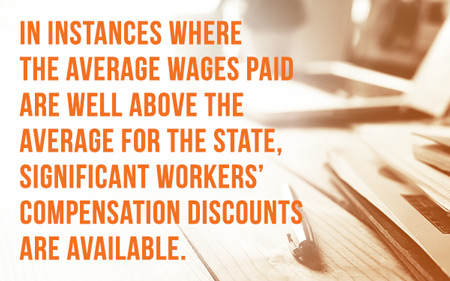Improve Workers’ Compensation Costs With CCPAP
June 3, 2021
Contractors purchasing commercial insurance may have noticed that most of their coverage rates have either increased or been warned by their brokers to prepare for increases due to the hardening insurance market. However, one of the highlights in most renewals is the continued reduction of workers’ compensation rates, which in some cases helps offset the increases to other lines of coverage. Even though workers’ compensation may be the bright spot in many renewals, there may be more that you can do to alleviate costs even further.
CCPAP overview
The NCCI Contracting Classification Premium Adjustment Program (CCPAP) is a workers’ compensation discount program that provides premium credits to employers that pay higher than average wages to employees classified within contracting class codes. NCCI is a national rating bureau focused on workers’ compensation that gathers data and analyzes industry trends in order to provide objective insurance rate and loss cost recommendations. Generally, the higher the average wage, the higher the credit. Thirty-five states have designated NCCI as their licensed rating and statistical organization, and the contractor’s credit qualification requirements differ for each. When reviewing these requirements, there are effectively five items to consider.
- Eligible class codes
- Percent of manual premium in the eligible class codes (some states require at least 50%)
- Experience modification rating requirements (some states require the EMR to be < 1.00)
- Approved formulas for calculation
- Average weekly wage requirements
It is essential to review the requirements annually, as it is not uncommon for the requirements to change frequently in each participating state.

Completing the application
Completing the CCPAP application is a relatively painless process that requires completing a short application and maintaining accurate financial records. NCCI has a nationally approved application form (NC-5000B), but some states require their own approved form. The major distinction is that the state form will outline the state-specific requirements to receive the credit. An application must be submitted for each NCCI CCPAP participating state individually, regardless of whether the same carrier is providing coverage. If the application is not submitted within 180 days of the effective date, the policyholder may request an exception from the carrier, for which a concession may or may not be made. Once the application is filed and approved, the policyholder will receive a preliminary CCPAP factor, and the discount amount will be checked during a policy audit to ensure the accuracy of the average wages paid. This check is important because if it is determined that the average wages paid in the contracting class codes are less than the amount provided on the application, the discount will be reduced, and the policyholder may owe additional premiums.
In instances where the average wages paid are well above the average for the state, significant workers’ compensation discounts are available. This can be a competitive advantage in bidding environments where labor costs are a main contributing factor to overall job expenses. Most companies usually depend on insurance brokers to ensure the credit is applied for, and they can even help submit the application. For more information regarding eligibility for the CCPAP credit and participating states, reach out to Parker, Smith & Feek’s Construction Practice Group.
The views and opinions expressed within are those of the author(s) and do not necessarily reflect the official policy or position of Parker, Smith & Feek. While every effort has been taken in compiling this information to ensure that its contents are totally accurate, neither the publisher nor the author can accept liability for any inaccuracies or changed circumstances of any information herein or for the consequences of any reliance placed upon it.


